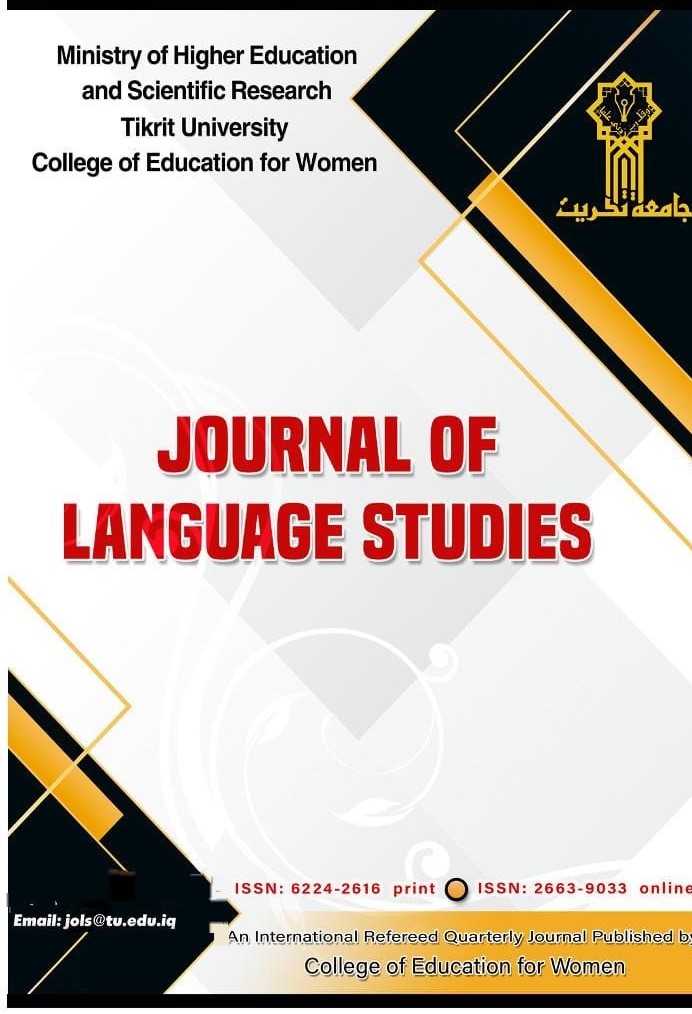Abstract
The research sheds light on how to understand and deal with the problem contained in this phrase ((neither verbally nor appreciatively)), which was mentioned in some grammatical issues. After inventorying those issues containing this phrase, I found that the phrase deserves a clarification study, and understanding it requires careful thought and thought in order to reach a conclusion. Proper understanding of it; In order for the reader and student to understand its meaning without difficulty and difficulty, and to clarify its meaning and clarification comes through discussing those grammatical issues that were extracted from grammatical books, and this study came under the title: {Places of absence of pronunciation and appreciation in Arabic grammar{.
It became clear through research that the relationship between pronunciation and estimation is a relationship of association, either positively or negatively. If the pronunciation works outwardly, then the estimation works analogously. The supposed pronunciation and estimation are associated with each other in these grammatical issues, either in a positive form or in a negative form. Among the following expressions are: (Verbally and appreciatively) or its complete opposite (neither verbally nor appreciatively). The first phrase is clear and the second phrase is ambiguous, and it is the subject of my study in the research.
The reasons varied from one topic to another in the event that the factor or sentence does not need the word verbally or appreciatively, the completeness of the meaning and the sentence not needing an assumed assessment, or there is no change in the ruling of the pronunciation or in the interpretation of its assessment, or the loss of the effect of the factor and his influence on what is done verbally or appreciatively. Or connecting them verbally or in any way, its meaning changes to another meaning, as will appear in the following issues.
It became clear through research that the relationship between pronunciation and estimation is a relationship of association, either positively or negatively. If the pronunciation works outwardly, then the estimation works analogously. The supposed pronunciation and estimation are associated with each other in these grammatical issues, either in a positive form or in a negative form. Among the following expressions are: (Verbally and appreciatively) or its complete opposite (neither verbally nor appreciatively). The first phrase is clear and the second phrase is ambiguous, and it is the subject of my study in the research.
The reasons varied from one topic to another in the event that the factor or sentence does not need the word verbally or appreciatively, the completeness of the meaning and the sentence not needing an assumed assessment, or there is no change in the ruling of the pronunciation or in the interpretation of its assessment, or the loss of the effect of the factor and his influence on what is done verbally or appreciatively. Or connecting them verbally or in any way, its meaning changes to another meaning, as will appear in the following issues.
Keywords
applied
appreciation
factor
hypothetical.
Influence
interpretation
movement
nihilism
pronunciation
Abstract
يسلط البحث الضوء على كيفية معالجة الإشكالية المتضمنة لها هذه العبارة ((لا لفظًا ولا تقديرًا)) وفهمها، وقد وردت في عدد المسائل النحوية ، وبعد تتبُّع تلك المسائل ، وجدتُ أن العبارة تستحق دراسةً توضيحية، وفهمها يحتاج إلى تأنٍّ وتفكُّرٍ من أجل الوصول إلى الفهم السليم لها؛ ليستوعب القارئ أو الطالب معناها من غير عسر ومشقة، وبيان معناها وتوضيحها يأتي من خلال مناقشة تلك المسائل النحوية التي تمت جردها من الكتب النحوية ، وجاءت هذا البحث تحت عنوان: {مواضع انتفاء اللفظ والتقدير في النحو العربي}.
واتضح من خلال البحث أن العلاقة بين اللفظ والتقدير علاقة تلازمية ، وغالبا ما يكون (اللفظ والتقدير) المفترضان مع بعضهما البعض في تلك المسائل النحوية إما بصيغة إيجاب ، وإما بصيغة نفي، فمن تلك العبارات الواردة : (لفظًا وتقديرًا) أو عكسها تمامًا (لا لفظًا ولا تقديرًا) , فالعبارة الأولى واضحة والعبارة الثانية غامضة وهي موضوع دراستي في هذا البحث .
وتعددت الأسباب من موضوع إلى آخر في حالة عدم احتياج العامل أو الجلمة إلى اللفظ نطقا أو تقديرًا، أو لاكتمال المعنى وعدم احتياج الجملة إلى تقدير مفترض، أو عدم حدوث تغيير في حكم اللفظ أو في تأويل تقديره، أو لفقدان أثر العامل وتأثيره في المعمول لفظًا وتقديرًا, أو الاقتران بينهما لفظًا أو تقديرًا بأيِّ شكل من الأشكال يتحول معناها إلى معنى آخر كما تظهر في المسائل القادمة.
واتضح من خلال البحث أن العلاقة بين اللفظ والتقدير علاقة تلازمية ، وغالبا ما يكون (اللفظ والتقدير) المفترضان مع بعضهما البعض في تلك المسائل النحوية إما بصيغة إيجاب ، وإما بصيغة نفي، فمن تلك العبارات الواردة : (لفظًا وتقديرًا) أو عكسها تمامًا (لا لفظًا ولا تقديرًا) , فالعبارة الأولى واضحة والعبارة الثانية غامضة وهي موضوع دراستي في هذا البحث .
وتعددت الأسباب من موضوع إلى آخر في حالة عدم احتياج العامل أو الجلمة إلى اللفظ نطقا أو تقديرًا، أو لاكتمال المعنى وعدم احتياج الجملة إلى تقدير مفترض، أو عدم حدوث تغيير في حكم اللفظ أو في تأويل تقديره، أو لفقدان أثر العامل وتأثيره في المعمول لفظًا وتقديرًا, أو الاقتران بينهما لفظًا أو تقديرًا بأيِّ شكل من الأشكال يتحول معناها إلى معنى آخر كما تظهر في المسائل القادمة.
